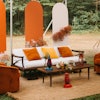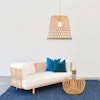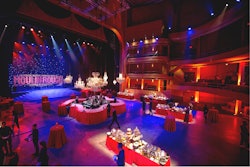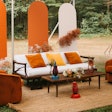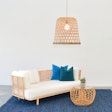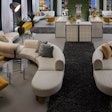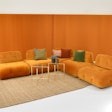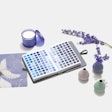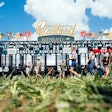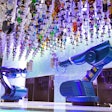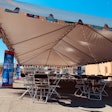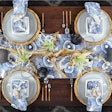If you are looking to free guests from being stuck for hours at dinner tables yet still raise money, read closely. The Fragrance Foundation showed some nifty ideas at the FiFi awards last Thursday, May 31.
Back in April 2006, the foundation was in the same position—another year, another awards show where everyone wanted the cocktail party to go on and on but instead had to sit quietly in the same place for hours watching a never-ending program. Change was in order, said foundation president Rochelle Bloom, so she formed a search committee and put out bids for new ideas.
“What our industry loves is the networking. Even though they are competitors, they get great satisfaction out of schmoozing,” Bloom said.At Dalzell Productions, which had produced the event for the previous three years, “everybody was pretty much done with chicken dinners,” said creative director Joshua Cicerone. They came back with a radical recommendation: Scratch the tables, shorten the award program, and sell lounge spaces instead. The idea was to bring the feeling of bottle service to a benefit and create the feel of an exclusive nightclub, a concept inspired by the Vanity Fair Oscar party.
“We knew it was a big risk," Bloom said. "We thought, The worst thing that can happen is it fails and we revert to last year’s format.”
So they changed the venue (from the Hammerstein Ballroom to the Winter Garden), then the date (early April to late May), and, finally, just about everything else, including the name: The FiFi Awards became the FiFi Awards and Celebration, with the emphasis on the celebration. Instead of a cocktail hour, the award show took place in a tent on the plaza first and lasted only 45 minutes. Then guests entered the Winter Garden, which had been set up with private lounges, for cocktails.
The planners also added an entertainment element. John Legend sang two 15-minute sets, the first of which occupied the crowd while the tent was transformed from theater-style seating to long dining tables. Dinner was tapas-influenced and served buffet-style in the tent and on small plates in the lounges.
The new concept was so well received that the first 16 lounges sold out immediately after the foundation announced the change, and another 14 were added.
“The best part about it was that people felt they got to see everybody and move around. There were no rules; they didn’t have to sit [and be] quiet. They could eat and drink as much as they wanted,” Bloom said.
In the future, she would like to find a space where all 1,000 guests can be on the same level (because of space constrictions, tables had to be added on the second floor), start it earlier so people don’t get too hungry by the time dinner is served, and improve the flow—there was a minor bottleneck when guests entered the room. “People came in confused,” she said. “Next year people will know better."
Back in April 2006, the foundation was in the same position—another year, another awards show where everyone wanted the cocktail party to go on and on but instead had to sit quietly in the same place for hours watching a never-ending program. Change was in order, said foundation president Rochelle Bloom, so she formed a search committee and put out bids for new ideas.
“What our industry loves is the networking. Even though they are competitors, they get great satisfaction out of schmoozing,” Bloom said.At Dalzell Productions, which had produced the event for the previous three years, “everybody was pretty much done with chicken dinners,” said creative director Joshua Cicerone. They came back with a radical recommendation: Scratch the tables, shorten the award program, and sell lounge spaces instead. The idea was to bring the feeling of bottle service to a benefit and create the feel of an exclusive nightclub, a concept inspired by the Vanity Fair Oscar party.
“We knew it was a big risk," Bloom said. "We thought, The worst thing that can happen is it fails and we revert to last year’s format.”
So they changed the venue (from the Hammerstein Ballroom to the Winter Garden), then the date (early April to late May), and, finally, just about everything else, including the name: The FiFi Awards became the FiFi Awards and Celebration, with the emphasis on the celebration. Instead of a cocktail hour, the award show took place in a tent on the plaza first and lasted only 45 minutes. Then guests entered the Winter Garden, which had been set up with private lounges, for cocktails.
The planners also added an entertainment element. John Legend sang two 15-minute sets, the first of which occupied the crowd while the tent was transformed from theater-style seating to long dining tables. Dinner was tapas-influenced and served buffet-style in the tent and on small plates in the lounges.
The new concept was so well received that the first 16 lounges sold out immediately after the foundation announced the change, and another 14 were added.
“The best part about it was that people felt they got to see everybody and move around. There were no rules; they didn’t have to sit [and be] quiet. They could eat and drink as much as they wanted,” Bloom said.
In the future, she would like to find a space where all 1,000 guests can be on the same level (because of space constrictions, tables had to be added on the second floor), start it earlier so people don’t get too hungry by the time dinner is served, and improve the flow—there was a minor bottleneck when guests entered the room. “People came in confused,” she said. “Next year people will know better."
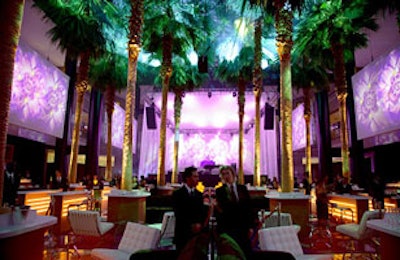
Photo: Marina Fragoso Senra for BizBash
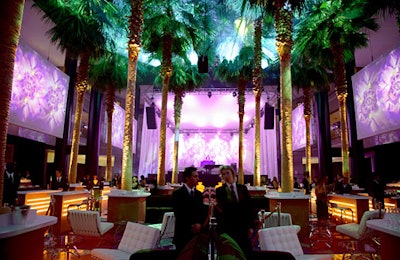
The Fragrance Foundation sold private party lounges, transforming the Winter Garden into a private nightclub, so guests could mingle and relax without being stuck at one table all night.
Photo: Marina Fragoso Senra for BizBash

Guests walked down the red carpet and into the tent on the plaza for a 45-minute award show. Video elements were downplayed and scenic flourishes were cut to save money for the celebration portion of the evening.
Photo: Marina Fragoso Senra for BizBash
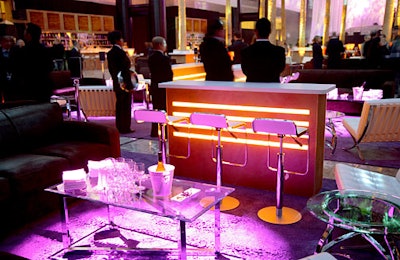
Each lounge had brown suede couches, white Barcelona chairs, glass tables, and custom-made bars lit from within. Purple area rugs and red ropes created distinct spaces. The table decor was simple, with only napkins, glasses, a chilled bottle of white wine, and a dish of olives, almonds, and cured pickles.
Photo: Marina Fragoso Senra for BizBash
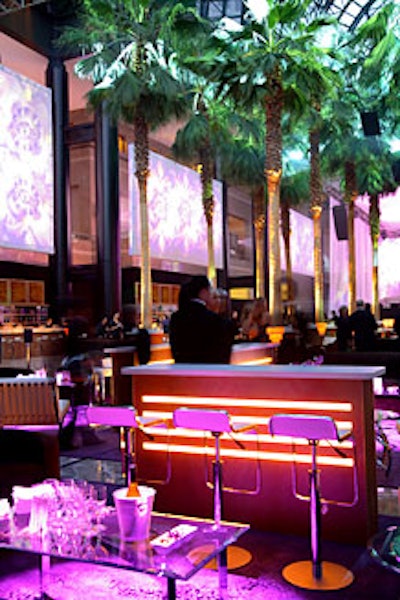
Lighting was crucial to making the enormous Winter Garden feel more intimate. Seven huge projection screens displayed abstract images of flowers, shielding the view of the second-floor balcony.
Photo: Marina Fragoso Senra for BizBash
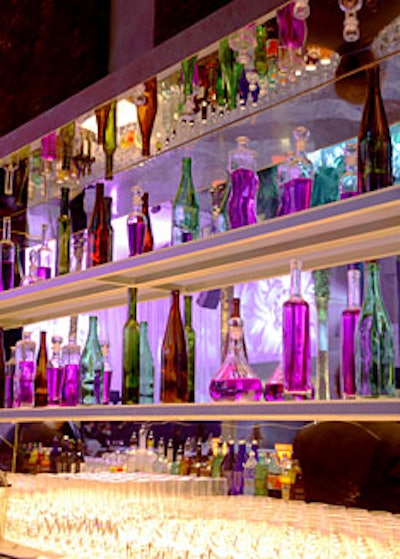
Brown, green, and crystal bottles filled with purple water—reminiscent of large perfume bottles—were reflected in the mirrors behind the bars.
Photo: Marina Fragoso Senra for BizBash
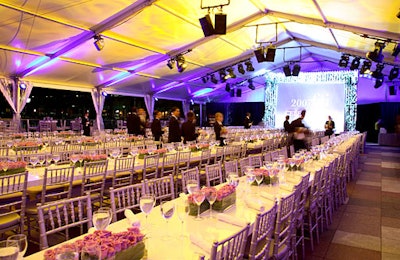
Dalzell Productions and Great Performances had 45 minutes to transform the tent from theater-style seating to dining tables. For those without private lounges, dinner was served buffet-style and seating was open.
Photo: Marina Fragoso Senra for BizBash
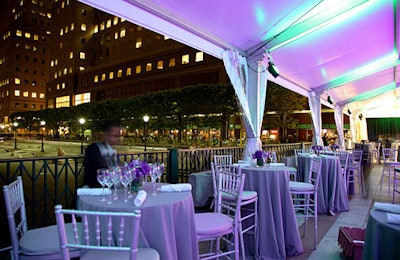
It was a beautiful spring night, so after the awards, the tent's walls were opened to the plaza and views of the Hudson River.
Photo: Marina Fragoso Senra for BizBash

